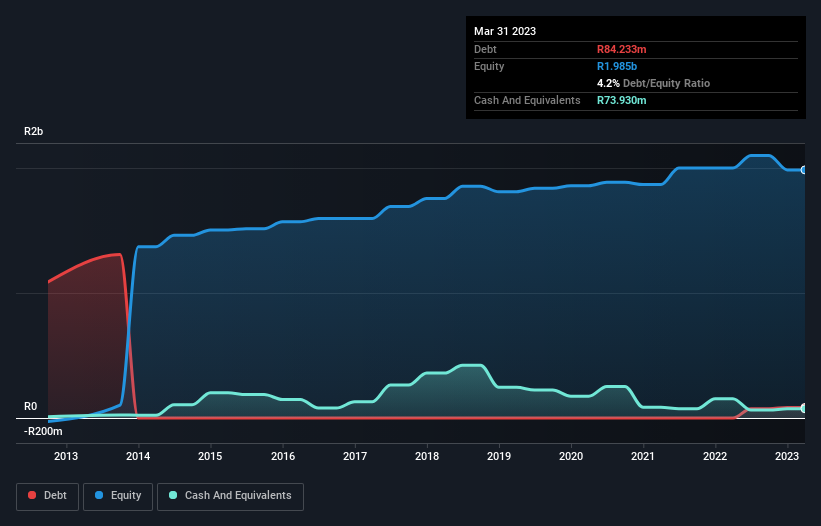Warren Buffett famously said, 'Volatility is far from synonymous with risk.' When we think about how risky a company is, we always like to look at its use of debt, since debt overload can lead to ruin. As with many other companies Quantum Foods Holdings Ltd (JSE:QFH) makes use of debt. But should shareholders be worried about its use of debt?
What Risk Does Debt Bring?
Debt and other liabilities become risky for a business when it cannot easily fulfill those obligations, either with free cash flow or by raising capital at an attractive price. Ultimately, if the company can't fulfill its legal obligations to repay debt, shareholders could walk away with nothing. While that is not too common, we often do see indebted companies permanently diluting shareholders because lenders force them to raise capital at a distressed price. Of course, the upside of debt is that it often represents cheap capital, especially when it replaces dilution in a company with the ability to reinvest at high rates of return. When we examine debt levels, we first consider both cash and debt levels, together.
Check out our latest analysis for Quantum Foods Holdings
How Much Debt Does Quantum Foods Holdings Carry?
You can click the graphic below for the historical numbers, but it shows that as of March 2023 Quantum Foods Holdings had R84.2m of debt, an increase on none, over one year. On the flip side, it has R73.9m in cash leading to net debt of about R10.3m.

A Look At Quantum Foods Holdings' Liabilities
According to the last reported balance sheet, Quantum Foods Holdings had liabilities of R759.4m due within 12 months, and liabilities of R292.2m due beyond 12 months. Offsetting these obligations, it had cash of R73.9m as well as receivables valued at R711.1m due within 12 months. So its liabilities outweigh the sum of its cash and (near-term) receivables by R266.6m.
This deficit isn't so bad because Quantum Foods Holdings is worth R864.3m, and thus could probably raise enough capital to shore up its balance sheet, if the need arose. However, it is still worthwhile taking a close look at its ability to pay off debt. But either way, Quantum Foods Holdings has virtually no net debt, so it's fair to say it does not have a heavy debt load! When analysing debt levels, the balance sheet is the obvious place to start. But it is Quantum Foods Holdings's earnings that will influence how the balance sheet holds up in the future. So if you're keen to discover more about its earnings, it might be worth checking out this graph of its long term earnings trend.
In the last year Quantum Foods Holdings wasn't profitable at an EBIT level, but managed to grow its revenue by 19%, to R6.6b. We usually like to see faster growth from unprofitable companies, but each to their own.
Caveat Emptor
Over the last twelve months Quantum Foods Holdings produced an earnings before interest and tax (EBIT) loss. Indeed, it lost R9.1m at the EBIT level. When we look at that and recall the liabilities on its balance sheet, relative to cash, it seems unwise to us for the company to have any debt. Quite frankly we think the balance sheet is far from match-fit, although it could be improved with time. Another cause for caution is that is bled R110m in negative free cash flow over the last twelve months. So in short it's a really risky stock. The balance sheet is clearly the area to focus on when you are analysing debt. But ultimately, every company can contain risks that exist outside of the balance sheet. For instance, we've identified 2 warning signs for Quantum Foods Holdings (1 doesn't sit too well with us) you should be aware of.
If you're interested in investing in businesses that can grow profits without the burden of debt, then check out this free list of growing businesses that have net cash on the balance sheet.
Valuation is complex, but we're here to simplify it.
Discover if Quantum Foods Holdings might be undervalued or overvalued with our detailed analysis, featuring fair value estimates, potential risks, dividends, insider trades, and its financial condition.
Access Free AnalysisHave feedback on this article? Concerned about the content? Get in touch with us directly. Alternatively, email editorial-team (at) simplywallst.com.
This article by Simply Wall St is general in nature. We provide commentary based on historical data and analyst forecasts only using an unbiased methodology and our articles are not intended to be financial advice. It does not constitute a recommendation to buy or sell any stock, and does not take account of your objectives, or your financial situation. We aim to bring you long-term focused analysis driven by fundamental data. Note that our analysis may not factor in the latest price-sensitive company announcements or qualitative material. Simply Wall St has no position in any stocks mentioned.
About JSE:QFH
Quantum Foods Holdings
Engages in the feed, poultry, and egg businesses in South Africa and other African markets.
Excellent balance sheet and good value.
Market Insights
Community Narratives




